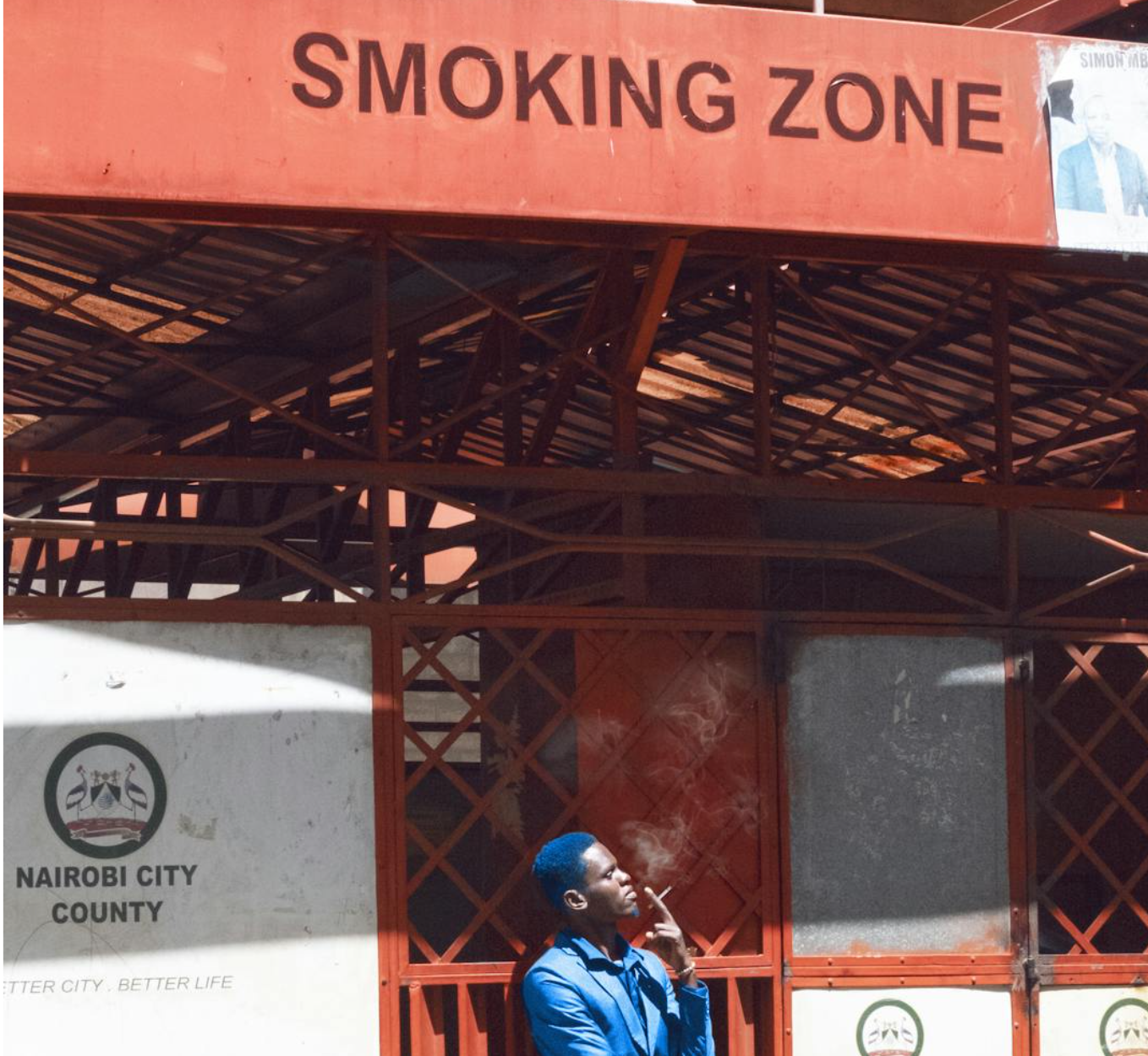 One medic argues removal of smoking zones may do more harm than good. "Because I have not come
across alternatives."
One medic argues removal of smoking zones may do more harm than good. "Because I have not come
across alternatives."
Smoking in Nairobi’s streets and open spaces, especially in neighborhoods like Jamuhuri Estate, Westlands, Kilimani and large parts of Eastlands, is resurfacing, bringing health concerns that go beyond individual smoker habits.
Cigarette smoke now drifts into everyday spaces: bus stops, markets, residential courtyards, and public walkways. "I see groups smoking regularly just outside markets and along busy pavements," says a vendor in Jamuhuri. Passersby, including children, have no choice but to breathe it in.
According to the 2014 Global Adult Tobacco Survey (GATS), about 85 per cent of adults visiting bars and nightclubs reported exposure to tobacco smoke, while 17 per cent of adults working indoors experienced the same. Those figures predate today’s resurgence, suggesting the problem could be widening.
Public health experts stress there is no safe level of exposure. Second-hand smoke raises risks of asthma, cardiovascular disease, chronic lung conditions, and cancer. Children are especially vulnerable, facing reduced lung development, recurring bronchitis, and higher chances of asthma.
Dr Audi Stephanie, a Nairobi-based medical doctor, warns of the dangers.
“Smoking cigarettes has numerous
well-documented health risks,” she said. “Short-term effects include increased
heart rate, reduced lung function, nicotine addiction, and withdrawal symptoms.
Long-term effects include cancers such as lung, throat, mouth, pancreas, kidney
and bladder, as well as cardiovascular disease, strokes, heart attacks, chronic
obstructive pulmonary disease (COPD), emphysema, and chronic bronchitis.”
She added that smoking also affects reproductive health, fertility, fetal development, and can cause gum disease and eye problems. “Addiction to the nicotine in cigarette smoke can adversely impact someone’s ability to function and achieve their goals,” she said.
On smoking zones, Dr Audi noted: “The logic behind smoking zones is to protect non-smokers from second-hand smoke whilst upholding the freedom of others to smoke. Removal of smoking zones may do more harm than good because I have not come across alternatives. It would be good if they were strengthened.”
Kenya’s Tobacco Control Act (2007) and its 2014 regulations outlaw smoking in nearly all public and indoor settings, impose fines up to Sh50,000, and allow designated zones under strict conditions. Yet enforcement is weak.
A study of bars and restaurants showed smoking in 86 per cent of establishments despite rules requiring smoke-free venues. Oversight is particularly limited in informal settlements, though high-end suburbs have also faced scrutiny.
Kenya’s GATS found only 55 per cent of Kenyans knew the law protects them from second-hand smoke. Over 80 per cent supported higher tobacco taxes. Public support is strong, but awareness remains patchy.
Dr Toro Andrew, head of drug and substance abuse control at the State Department of Public Health, said counties are being alerted.
“We have activated all the county teams to ensure the law is followed,” he said. “We’ve been thinking about doing away with designated smoking areas. Globally, many countries are doing away with them and we are thinking of taking that route.”
He confirmed that fresh enforcement measures are underway. “We have activated multi-agency enforcement teams to investigate and enforce the law. We are proposing to ban smoking in any public place, and if possible, do away with designated zones.”
Dr Toro also warned about vape pens and e-cigarettes. “The other issue is the proliferation of new nicotine products—vapes, e-cigarettes, pouches. These are not anchored in the law right now. We need to define them so we can enforce properly.”
In the capital, Principal Public Health Officer and Head of the Tobacco Control Unit, Anthony Muthemba, backed a total ban on public smoking zones.
“The current public smoking zones within CBD (Koinange Street and Latema Street) are not owned by Nairobi County despite the logos used on them,” he said. “These are private entities and do not comply with Section 35 of the Tobacco Control Act. Despite efforts to get them upgraded or removed, there’s been interference from the tobacco industry. The way forward is for amendments to ban such zones completely.”
The challenge is not unique to Nairobi. In Indonesia, second-hand smoke exposure remains common in public spaces despite regulations. In China, cities such as Beijing and Harbin face similar problems amid partial enforcement and cultural leniency.
Market traders, drivers and residents say they feel abandoned.
“Children queue with us for water. Smoke from smokers on the roadside hurts—some cough endlessly,” said a trader in Kilimani.
“After work, they smoke near my car. I can’t open windows. It’s uncomfortable for passengers, but who to report?” asked a taxi driver in Jamuhuri.
A public health official, who requested anonymity, admitted: “We lack manpower to police every corner. Enforcement covers central zones, but peripheral areas slip through the cracks.”
Kenya’s legal framework is solid, and public sentiment supports tobacco control. But enforcement gaps, institutional weaknesses, and tobacco industry interference are undermining progress.
Experts point to four key priorities: stronger enforcement through visible officers and penalties, public awareness campaigns to educate citizens on their rights, community engagement to protect children in schools and markets, and more healthcare support for smokers who want to quit.
This return of public smoking in Nairobi may appear a nuisance to some, but its health hazards are far-reaching. Protecting non-smokers—especially children and informal workers—requires urgent action.
As one resident put it, with children around, secondhand smoke isn’t just a nuisance—it’s harm in plain sight.














